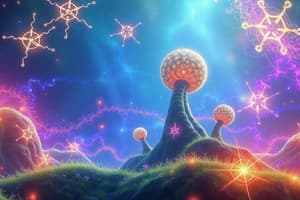Podcast
Questions and Answers
What is the definition of biology?
What is the definition of biology?
- The study of energy and its transformations
- The study of the origin of the universe
- The study of life and living organisms (correct)
- The study of non-living processes
Which of the following is NOT a property of life?
Which of the following is NOT a property of life?
- Growth and development
- Response and adaptation
- Spontaneous generation (correct)
- Organization
What does the property 'Energy' refer to in living organisms?
What does the property 'Energy' refer to in living organisms?
- The process of reproduction
- The organization of cells
- The capacity to perform work (correct)
- The ability to evolve over time
Which scientist first developed the concept of the nucleus within a cell?
Which scientist first developed the concept of the nucleus within a cell?
What does the modern version of cell theory state about heredity information?
What does the modern version of cell theory state about heredity information?
Which statement correctly summarizes cell theory?
Which statement correctly summarizes cell theory?
What is the first step of biological organization as mentioned?
What is the first step of biological organization as mentioned?
Which of the following best describes asexual reproduction?
Which of the following best describes asexual reproduction?
Flashcards are hidden until you start studying
Study Notes
Definition of Biology
- Biology is the study of life, focusing on living organisms and their vital processes.
- It encompasses the structure, function, growth, origin, evolution, and distribution of life forms.
Properties of Life
-
Organization: Living things exhibit a complex structure with specialized functions at various levels including:
- Cells
- Tissues
- Organs
- Organ systems
- Individuals
- Populations/Communities
- Ecosystems
-
Energy: Essential for performing work, energy exists in two forms:
- Potential Energy
- Kinetic Energy
-
Growth and Development:
- Growth refers to an increase in size.
- Development involves changes in shape or form.
-
Reproduction: The process through which new living organisms are created, categorized into:
- Sexual reproduction
- Asexual reproduction
-
Response and Adaptation: Organisms have unique adaptations that enhance their survival in specific environments.
Cell History
- 1650: Invention of the first microscope by Hans and Zacharias Janssen.
- 1665: Robert Hooke studied cells by examining cork under a microscope.
- 1674: Anton van Leeuwenhoek discovered "animalcules" (microorganisms) in water.
- 1833: Robert Brown identified the nucleus as the cell's central part.
- 1838: Mathias Schleiden established that plants are made of cells.
- 1839: Theodore Schwann confirmed that animals consist of cells, contributing to the Cell Theory.
- 1858: Rudolph Virchow declared that all living cells arise from pre-existing cells, dismissing the notion of spontaneous generation.
Cell Theory
- Cells are the fundamental unit of structure and function in all organisms.
- All living creatures comprise one or more cells.
- Cells arise only from previously existing cells through the process of cell division.
Modern Version of Cell Theory
- Energy flow occurs within cells.
- Hereditary information, conveyed by DNA, is passed from cell to cell.
- All cells share a common basic chemical composition.
Studying That Suits You
Use AI to generate personalized quizzes and flashcards to suit your learning preferences.




